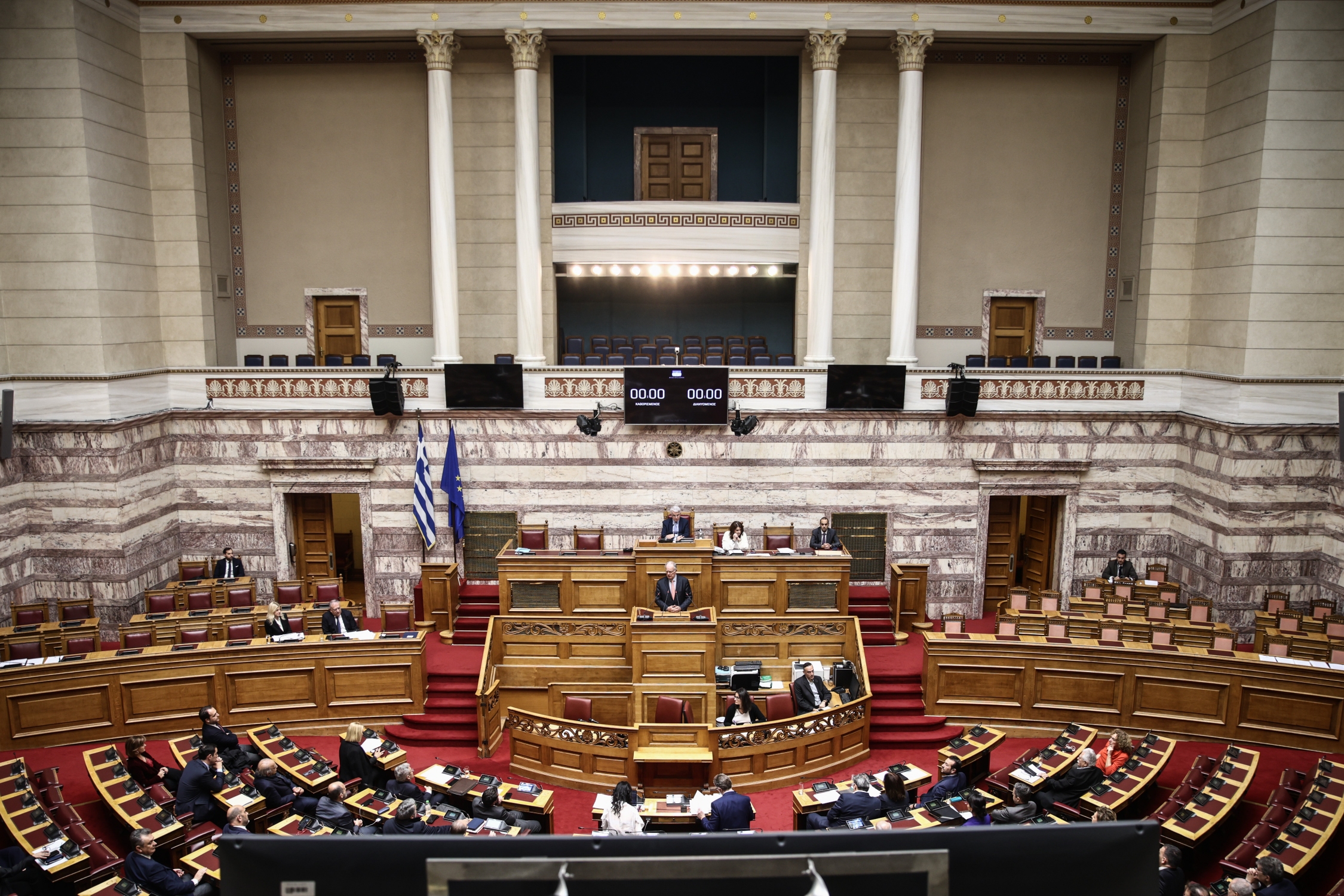Parliamentary discussions on Tempe tragedy: Investigation committee and motion of no confidence on the table

Specifically, today PASOK’s proposal concerns the establishment of a parliamentary investigation committee to examine potential offenses committed by Christos Triantopoulos, who was Deputy Minister to the Prime Minister at the time of the deadly train crash. Today’s discussion involves party representatives, and a secret vote will determine whether the committee will be formed. The decision requires an absolute majority of all MPs; otherwise, the proposal will be rejected.
“Party Representatives’ Responses: Key Criticisms and Calls for Accountability”
PASOK MP Milena Apostolaki emphasized in today’s discussion the impact of the 28 February public protests, stating that:
“The demonstrations have forced the PM to support the establishment of the preliminary investigation committee for Christos Triantopoulos, despite blocking his summons as a witness in the previous inquiry a year ago.”
She argued that there is a direct link between government mismanagement, the failure to complete Contract 717, and the tragic train accident. Apostolaki accused the government of a “crime cover-up,” highlighting that the concealment efforts began just hours after the disaster, with the PM initially attributing the tragedy to human error. She further criticized the government’s actions, claiming that unauthorized interventions took place in the aftermath, undermining judicial oversight. Concluding her speech, she stated,
“Together with the majority of Greek society, we are fighting to defeat the immoral and criminally incompetent state, and we stand with active, independent citizens in the pursuit of truth—something the PM has systematically tried to withhold from both the victims’ families and the entire Greek public for the past two years.”
Sokratis Famelos, leader of SYRIZA, called on PM Mitsotakis to resign, describing his government as delegitimized over its handling of the Tempe train disaster. He criticized the government’s efforts to cover up the tragedy, which were exposed by mass protests, and emphasized the need for accountability. Famelos pledged SYRIZA’s support for all parliamentary committees investigating the disaster and condemned the government for failing to start investigations into ministerial responsibilities. He also raised concerns about the statute of limitations on potential ministerial crimes related to the incident.
“You were pressured into voting for the investigation committee, and this is a major defeat for Mr. Mitsotakis, directly contradicting what he had said about the cover-up and the responsibilities of government members.”
“Tell Mr. Mitsotakis, who is not here today, that he must resign. His government has discredited both the judiciary and the institutions.”
Nikos Karathanassopoulos from Communist Party of Greece (KKE) criticized the handling of the Tempe train disaster, questioning whether the only charge is dereliction of duty or if there are also criminal offenses like obstruction of justice and complicity. He linked the cover-up of the disaster to the government’s attempt to hide evidence related to the explosion, raising suspicions of illegal activity, including potential smuggling. Karathanassopoulos also criticized the lack of funding and security systems in the rail sector, calling it part of a long-standing “premeditated crime.”
“Honestly, is it only dereliction of duty for Mr. Triantopoulos? Are there no criminal responsibilities, when through these acts he tried to cover up the causes and reasons for the crime that led to the deaths of 57 people?”
He also dismissed the PASOK proposal for a preliminary investigation, calling it fragmented and politically motivated, and emphasized that any minister’s prosecution would be decided by the ruling majority, likely resulting in minimal accountability.
Dimitris Koutsoumpas, General Secretary of KKE, emphasized that the ongoing investigation was driven by public pressure, not PASOK’s proposal. He accused the government of a cover-up, pointing to serious failures in railway safety and the involvement of government officials, including Deputy Minister Triantopoulos. Koutsoumpas argued that the tragedy was a result of profit-driven policies and systemic neglect, calling for accountability and stressing that only the people’s struggle could reveal the truth.
“It is not PASOK that has cornered you, but this proud people and their children.”
Elena Karageorgopoulou from Course of Freedom criticized the limited scope of the PASOK proposal for a preliminary investigation into former Deputy Minister Christos Triantopoulos. She emphasized that the issue is not just a misdemeanor but involves serious crimes, questioning why the crime scene was altered.
“Who, who had an interest in preventing the causes that led to the explosion and the massive fireball, which consumed the oxygen and caused the death of people, young children who had survived the collision, from being revealed? How did this happen, if not under the PM’s orders, for coordinated actions of covering the zone, deploying machinery and private contractors, who were later paid with public money?” asked the MP.
Peti Perka from New Left criticized the delayed deployment of the EODASAAM agency and questioned why the crime scene was altered, with the government paying 650,000 euros for the cleanup. She raised concerns over the lack of coordination and transparency, pointing to the government’s misleading statements and lack of answers regarding the fireball incident.
“The responsibility of the opposition for a radical alternative, not just urgent but imperative”
Tomorrow’s parliamentary debate
Tomorrow, 5 March, a parliamentary debate among party leaders will take place, focusing on the Tempe case, following requests by KKE and SYRIZA. On the same day, PASOK leader Nikos Androulakis plans to submit a motion of no confidence against the government, citing the EODASAAM report. PASOK is seeking support from other opposition parties. At least 50 signatures are needed to file the motion (PASOK has 32 MPs). If submitted, the debate will start within two days and last up to three days. A vote will follow, requiring an absolute majority of MPs for approval.
______________________________________________
Are you seeking news from Greece presented from a progressive, non-mainstream perspective? Subscribe monthly or annually to support TPP International in delivering independent reporting in English. Don’t let Greek progressive voices fade.
Make sure to reference “TPP International” and your order number as the reason for payment.